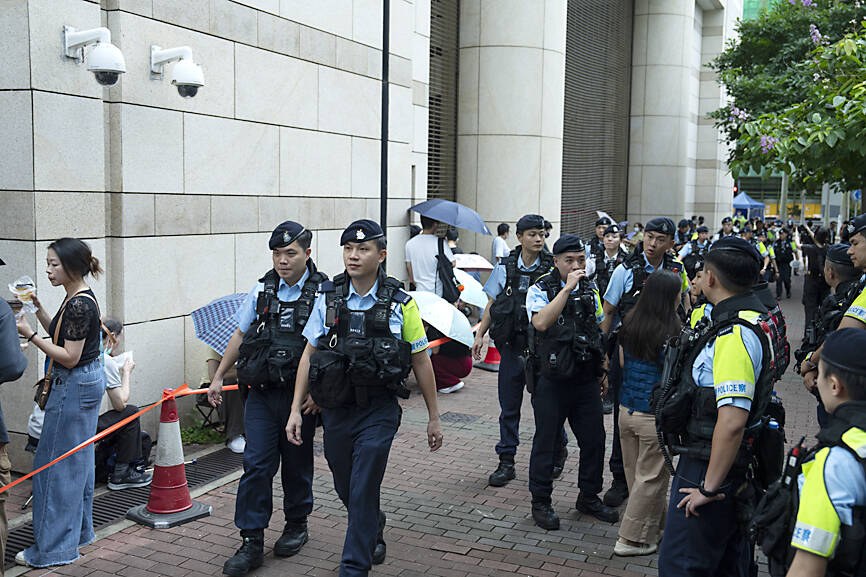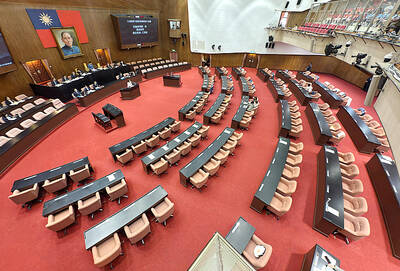A Hong Kong court yesterday began hearing appeals from 12 democracy campaigners jailed for subversion last year during the territory’s largest national security trial.
They were among 45 opposition figures, including some of Hong Kong’s best-known democracy activists, who were sentenced in November over a 2020 informal primary election that authorities deemed a subversive plot.
Critics, including the US, Britain and the EU, said the case showed how a Beijing-imposed National Security Law has eroded freedoms and quashed peaceful opposition in Hong Kong.

Photo: EPA
Former Hong Kong lawmakers “Long Hair” Leung Kwok-hung (梁國雄), Lam Cheuk-ting (林卓廷), Helena Wong (黃碧雲) and Raymond Chan (陳志全) are among those contesting their convictions and sentences in hearings that are scheduled to last 10 days.
Owen Chow (鄒家成), a 28-year-old activist who was sentenced to seven years and nine months in jail — the harshest penalty among the dozen — has also lodged an appeal.
Former district councilor Michael Pang (彭卓棋) withdrew his appeal application yesterday morning, leaving a total of 12 appellants.
Some of them have already spent more than four years behind bars.
The activists were accused of organizing or taking part in an unofficial primary election that aimed to improve the pro-democracy camp’s chances of winning a majority in the Legislative Council. They had hoped, once a majority was secured, to force the government to accede to demands such as universal suffrage by threatening to indiscriminately veto the budget — a plan that trial judges said would have caused a “constitutional crisis.”
Defense lawyer Erik Shum (沈士文) said that vetoing the budget was a form of “check and balance” built into Hong Kong’s mini-constitution that lawmakers could deploy as a last resort.
“In order to check the unpopular exercise of powers by the executive, one of the important measures is to tie the purse,” he told the court.
Shum said lawmakers should not be answerable to the courts over how they vote because of the separation of powers.
“Let politics remain in [the legislature] and let the public decide, not the judges,” he said.
Prosecutors also challenged the acquittal of lawyer Lawrence Lau (劉偉聰), one of two people found not guilty in May last year from an original group of 47 accused.
Lau’s “overall conduct” showed that he was party to the conspiracy and he should be tried again, because the lower court made the wrong factual finding, the prosecution said.
Lau, representing himself, said the trial court’s findings should not be “casually interfered” with.
“I have never advocated for the resignation of the chief executive, I have never advocated the indiscriminate vetoing of the financial budget,” Lau told the court, referring to core tenets of the alleged conspiracy.
Beijing has remolded Hong Kong in its authoritarian image after imposing a sweeping National Security Law in 2020 following months of huge, and sometimes violent, pro-democracy demonstrations.
Authorities arrested figures from a broad cross-section of the opposition in morning raids in 2021, the group later being dubbed the “Hong Kong 47.”
Aged between 27 and 69, they included democratically elected lawmakers and district councilors, as well as unionists, academics and others ranging from modest reformists to radical localists.
Dozens of police officers were deployed outside the West Kowloon court building yesterday morning as people queued to attend the hearing.
“They made a sacrifice... I hope they understand that Hongkongers have not forgotten them,” a public hospital worker in his 30s surnamed Chow said.
Amnesty International’s China director Sarah Brooks said the appeal would be a “pivotal test” for free expression in Hong Kong.
“Only by overturning these convictions can Hong Kong’s courts begin to restore the city’s global standing as a place where rights are respected and where people are allowed to peacefully express their views without fear of arrest,” Brooks said.

CROSS-STRAIT COLLABORATION: The new KMT chairwoman expressed interest in meeting the Chinese president from the start, but she’ll have to pay to get in Beijing allegedly agreed to let Chinese Nationalist Party (KMT) Chairwoman Cheng Li-wun (鄭麗文) meet with Chinese President Xi Jinping (習近平) around the Lunar New Year holiday next year on three conditions, including that the KMT block Taiwan’s arms purchases, a source said yesterday. Cheng has expressed interest in meeting Xi since she won the KMT’s chairmanship election in October. A source, speaking on condition of anonymity, said a consensus on a meeting was allegedly reached after two KMT vice chairmen visited China’s Taiwan Affairs Office Director Song Tao (宋濤) in China last month. Beijing allegedly gave the KMT three conditions it had to

‘BALANCE OF POWER’: Hegseth said that the US did not want to ‘strangle’ China, but to ensure that none of Washington’s allies would be vulnerable to military aggression Washington has no intention of changing the “status quo” in the Taiwan Strait, US Secretary of Defense Pete Hegseth said on Saturday, adding that one of the US military’s main priorities is to deter China “through strength, not through confrontation.” Speaking at the annual Reagan National Defense Forum in Simi Valley, California, Hegseth outlined the US Department of Defense’s priorities under US President Donald Trump. “First, defending the US homeland and our hemisphere. Second, deterring China through strength, not confrontation. Third, increased burden sharing for us, allies and partners. And fourth, supercharging the US defense industrial base,” he said. US-China relations under

The Chien Feng IV (勁蜂, Mighty Hornet) loitering munition is on track to enter flight tests next month in connection with potential adoption by Taiwanese and US armed forces, a government source said yesterday. The kamikaze drone, which boasts a range of 1,000km, debuted at the Taipei Aerospace and Defense Technology Exhibition in September, the official said on condition of anonymity. The Chungshan Institute of Science and Technology and US-based Kratos Defense jointly developed the platform by leveraging the engine and airframe of the latter’s MQM-178 Firejet target drone, they said. The uncrewed aerial vehicle is designed to utilize an artificial intelligence computer

The Chinese Nationalist Party (KMT) caucus yesterday decided to shelve proposed legislation that would give elected officials full control over their stipends, saying it would wait for a consensus to be reached before acting. KMT Legislator Chen Yu-jen (陳玉珍) last week proposed amendments to the Organic Act of the Legislative Yuan (立法院組織法) and the Regulations on Allowances for Elected Representatives and Subsidies for Village Chiefs (地方民意代表費用支給及村里長事務補助費補助條例), which would give legislators and councilors the freedom to use their allowances without providing invoices for reimbursement. The proposal immediately drew criticism, amid reports that several legislators face possible charges of embezzling fees intended to pay